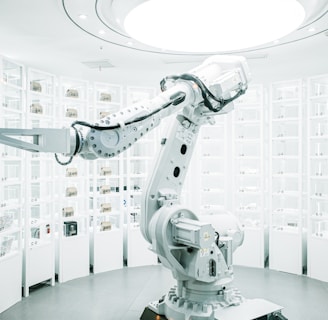Unlocking Efficiency with AI-Powered Automation
5/12/20243 min read


Unlocking Efficiency with AI-Powered Automation
In today's fast-paced business environment, organizations are constantly seeking ways to streamline their operations and increase efficiency. One of the most powerful tools available for achieving this is AI-powered automation. By harnessing the capabilities of artificial intelligence, businesses can automate repetitive tasks, reduce human error, and free up employees to focus on more strategic initiatives. In this article, we will explore the power of AI automation in streamlining business processes and the potential time and cost savings it can bring.
The Power of AI Automation
AI automation refers to the use of artificial intelligence technologies to automate tasks and processes that would typically require human intervention. This can range from simple tasks like data entry and scheduling appointments to more complex processes such as data analysis and decision-making. By automating these tasks, businesses can significantly improve their operational efficiency and productivity.
One of the key benefits of AI automation is the ability to eliminate repetitive and mundane tasks. For example, in many organizations, employees spend a significant amount of time manually entering data into various systems. This not only consumes valuable time but also increases the risk of human error. By leveraging AI technologies, businesses can automate data entry processes, reducing the chances of errors and freeing up employees to focus on more value-added activities.
Another area where AI automation can make a significant impact is in scheduling appointments. Traditionally, this process involves back-and-forth communication between multiple parties to find a suitable time slot. With AI-powered automation, businesses can use intelligent scheduling algorithms to automatically find the best available time slot based on participants' preferences and availability. This not only saves time but also improves customer satisfaction by providing a seamless and efficient scheduling experience.
Reducing Human Error
Human error is an inevitable part of any manual process. Even the most diligent employees can make mistakes, leading to costly errors and delays. By leveraging AI automation, businesses can reduce the risk of human error and ensure greater accuracy in their operations.
AI-powered automation systems are designed to perform tasks with a high degree of precision and consistency. They can analyze large amounts of data, identify patterns, and make decisions based on predefined rules. This eliminates the potential for human error and ensures that tasks are completed accurately and efficiently.
For example, in industries such as finance and accounting, where accuracy is paramount, AI automation can be used to automate processes like invoice processing and reconciliation. These tasks typically involve manual data entry and are prone to errors. By implementing AI automation, businesses can significantly reduce the risk of errors, resulting in improved financial accuracy and compliance.
Freeing Up Employees for Strategic Initiatives
One of the most valuable benefits of AI automation is the ability to free up employees from mundane and repetitive tasks, allowing them to focus on more strategic initiatives. By automating time-consuming and low-value tasks, businesses can empower their employees to engage in activities that require human creativity, critical thinking, and problem-solving skills.
For instance, instead of spending hours manually generating reports or analyzing data, employees can leverage AI-powered analytics tools to quickly gather insights and make informed decisions. This not only saves time but also enables employees to focus on strategic initiatives that drive business growth and innovation.
Furthermore, AI automation can also enhance employee job satisfaction by eliminating monotonous tasks and providing opportunities for skill development. When employees are freed from repetitive tasks, they can engage in more meaningful and challenging work, which can lead to increased job satisfaction and motivation.
Potential Time and Cost Savings
Implementing AI-powered automation can result in significant time and cost savings for businesses. By automating repetitive tasks and reducing human error, organizations can achieve greater operational efficiency and productivity.
According to a study conducted by McKinsey, AI automation has the potential to automate up to 45% of the activities currently performed by individuals, saving businesses an estimated 20% of their time. This translates into substantial cost savings as fewer resources are required to complete tasks. Additionally, AI automation can also help businesses reduce the risk of costly errors and improve overall customer satisfaction.
For example, in the healthcare industry, AI automation can streamline patient appointment scheduling, reduce waiting times, and improve the overall patient experience. By automating these processes, healthcare providers can optimize their resource allocation, reduce administrative costs, and provide better quality care to patients.
In conclusion, AI-powered automation has the potential to revolutionize business processes and unlock new levels of efficiency. By automating repetitive tasks, reducing human error, and freeing up employees to focus on more strategic initiatives, businesses can achieve significant time and cost savings. As AI technologies continue to advance, organizations that embrace automation will gain a competitive edge and position themselves for success in the digital age.
Let's talk
Get in touch
Follow us
Synaptic Company Limited
Synaptic Co., Ltd. © Copyright 2024 All rights reserved.
Synaptic Co., Ltd.
9/1070 Udomsuk3 Sukhumwit103 Rd. Bangna, Bangkok, Thailand, 10260
